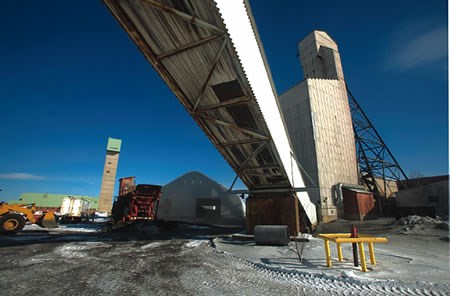Plummeting metal and commodity prices flattened some junior and medium-sized miners in Northern Ontario last month.
First Nickel, FNX Mining and Ursa Major Minerals and Lac des Iles Mine announced suspensions in all or parts of their mine projects in the North as operating costs come under pressure from falling commodity prices.
Sudbury miner First Nickel announced Oct.19 it was suspending operations at its flagship Lockerby Mine and placing it under care and maintenance.
The 150,000-annual tonne producer is laying off 140 of its 160 workers at its only mine in the city’s west end.
Within days, another mid-tier producer, FNX Mining, suspended commercial production in parts of its Levack Mine complex, north of the city. North American Palladium’s Lac des Iles Mine in the northwest is the latest, and biggest, casualty. The mine was placed under care and maintenance and the temporary closure has resulted in the layoff of 350 employees.
This news has also come on the heels of Ursa Major Minerals’ decision to temporarily shut down pre-production at its Shakespeare Nickel Project, 70 km west of Sudbury.
“We’ve been teetering for some months,” says First Nickel president Bill Anderson.
Securing debt financing was becoming “dicey” in recent weeks as the company moved toward bringing a new 2.9-million tonne nickel-copper reserve into production. Buying new equipment and other infrastructure expenses required an upfront cost of $52 million of the $86 million expansion project total, he said.
With September and October nickel prices falling as low as $4.30 a pound, Anderson and management “realized we couldn’t go like this and made the decision to cease.”
“Cash is king for a company our size.”
First Nickel acquired Lockerby from then-Falconbridge (now Xstrata Nickel) in 2005 and began operations a year later.
Anderson said Lockerby is a high-cost operation, but they believed reserves and resources could be built up through a major drilling campaign to a point where they could re-capitalize the mine and increase production.
With the company’s cash operating costs to process nickel at $6.50 a pound in August, they were re-working their feasibility study to get it under $5 per pound, while seeking new investment or partnerships.
Anderson said it will be difficult to predict how long the shutdown will last given the volatility in the capital markets and overall economy.
“We said to our employees we’re going to do our damnedest to bring this thing back together again, but we honestly don’t know when and aren’t too sure how.”
Sudbury’s other mid-tier producer, FNX Mining, was temporary suspending production at its Levack Mine.
No layoffs are coming among its 800-person workforce, says investor relations spokesman Dave Constable. Employees will be shifted to other high-margin operations at McCreedy West, Podolsky and other deposits.
“It’s no big consequence for us. We don’t have a mill and a smelter to feed and other operations dependent on this.”
As a new mine (Levack started commercial production in January 2007), Constable said Levack is a fairly high-cost operation with a significant amount of additional development still needed towards a 15 to 20-year mine life.
However, the 70-year-old Levack complex remains open as a logistical crossroads to handle nickel ore coming from McCreedy and to access other high-grade operations such as Rob’s Deposit.
Constable says the company has enough financial flexibility in its treasury to pull people and equipment out of the Levack Deposit and divert them to more viable projects.
The company had been eyeing Levack’s since August, when the $30 million detailed for that mine was diverted to other higher-metals projects.
“Right now people are managing for survival. We’ve put enough money in the treasury so we can bring Levack Footwall and Podolsky into full production.”
“That’s gotta be our focus, rather than burn up capital now for an operation that may be below water.”
Also contributing to the closure was FNX’s issues with their processor Vale Inco on final metal accountabilities.
Constable said cost structures over an eight-year period, from 2000 to 2008, in labour, energy, steel, explosives, transportation trucks, tire have doubled.
Although FNX never publishes their break-even price to produce nickel in Sudbury, Constable said the company’s production costs were below current prices posted in October.
Still, he remained upbeat that the prices will rebound. “Twenty-four dollars isn’t any more realistic than $4 is.”
The downturn in mineral prices has not yet affected an expansion with a big Timmins copper producer.
Xstrata Copper in Timmins is progressing with construction to dig deeper at the 40-year-old Kidd Mine with a $121-million expansion to take the copper-zinc operation down to 9,500 feet.
Since it’s previously approved money, “it’s business as usual,” said Kidd Mine general manager Tom Semadeni, as 75 contractors from Dumas Mining continue to excavate toward a 2010 completion date.
“We’re still running and we have no intention of changing our operating position.”
Semadini said many small juniors that started up with marginal operations in recent years, buoyed by high metal prices, particularly when nickel was skyrocketing up to $24-a pound, are now in trouble.
“We’re getting concerned calls and we’re looking at budgets, but the project is still robust and we’re still assuming we’re going ahead.”
Vale Inco spokeswoman Angie Robson would not comment if any decisions were pending on the new Sudbury mine projects at Coleman, Totten and Copper Cliff Deep.




